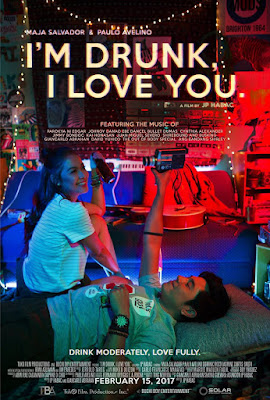SHATTERED GLASS (Billy Ray, 2003)
Here's a movie written by a screenwriter who knows how to thrill using normal conversation. With co-writing credits such as STATE OF PLAY (which is another journalism-themed thriller), FLIGHTPLAN, and the upcoming HUNGER GAMES movie, Billy Ray dishes one intense scene after another in SHATTERED GLASS, a true story based on an article written by H.G. Bissinger for Vanity Fair about The New Republic Associate Editor Stephen Glass.
But wait there's more. Billy Ray also directs this cat and mouse game (he proves to be quite an effective suspense director with this, and his 2007 film, BREACH), putting to a good test the code of ethics of journalism. In this tale however, the offense committed against the moral foundations of journalism is clear cut, and the penalty shall be exacted without consideration whatsoever.
Hayden Christensen gives the performance of his career as Stephen Glass, the journalist who became famous with his heavily-researched and thought-provoking articles, most of which later on were proven to be ridiculously fabricated. Christensen shows a cool, charismatic facade to Glass, with hints of ego spiking all over in his words and in his actions. In the latter part of the film, he transforms from confident to desperate, and his portrayal of a pathological liar stumbling for a way out is absorbing. Oscar-worthy in a nutshell.
Equally of caliber is Peter Sarsgaard who plays Glass' editor Chuck Lane, at first suspected and later on declared as a kiss ass short of editorial experience, but proves to be film's protagonist in the end. Billy Ray writes Lane's character quite interestingly, presented as an authority figure who acts exactly as how a leader should: fair and considerate. Of particular highlight of Sarsgaard's powerful acting in SHATTERED GLASS is the confrontation scene towards the ending, where he tells Chloe Sevigny's Caitlin (Glass' coworker) the following lines (the best sentence is in bold italic):
Caitlin Avey: What the hell did you do to Steve? He called me from his car, hysterical. I asked him what was wrong, he said, "ask Chuck?"
Chuck Lane: I fired him, okay? Not suspended, fired. Because this wasn't an isolated incident Caitlin. He cooked a dozen of them, maybe more. And we're going to have to go through them, you and I. We're going to have to go through all of them, now.
Caitlin Avey: No, the only one was Hack Heaven. He told me that himself.
Chuck Lane: If he were a stranger to you, if he was a guy you were doing a piece about, pretend that guy told you he'd only did it once. Would you take his word for it? Of course not! You'd dig and you'd bury him! And you'd feel offended if anyone told you not to.
Caitlin Avey: Every one of those pieces was fact-checked, they were all...
Chuck Lane: So was Hack Heaven!
[pause]
Chuck Lane: You're a good reporter. You've always been such a smart and thorough reporter, why can't you be one now?
Caitlin Avey: Cause what you're telling me just is impossible, Chuck.
Chuck Lane: Go upstairs. Read 'em again.
Caitlin Avey: This is bullshit!
Chuck Lane: And make sure you go all the way back, because half of them ran when Mike was still here.
Caitlin Avey: That's what this is. Of course. I mean, what are you going to do, Chuck, pick us off, one by one? Everybody that was loyal to Mike, till you have a staff that belongs to you? Is that the kind of magazine you want to run?
Chuck Lane: Caitlin, when this thing blows, there isn't going to be a magazine anymore. If you want to make this about Mike, make it about Mike. I don't give a shit. You can resent me, you can hate me, but come Monday morning, we're all going to have to answer for what we let happen here. We're all going to have an apology to make! Jesus Christ! Don't you have any idea how much shit we're about to eat? Every competitor we ever took a shot at, they're going to pounce. And they should. Because we blew it, Caitlin. He handed us fiction after fiction and we printed them all as fact. Just because... we found him "entertaining." It's indefensible. Don't you know that?
Let us dissect the story briefly. Ray juxtaposes Glass' road to downfall with the scene of him making an inspirational speech to students about how to become a successful writer, and the irony is so thick you'd get bludgeoned in the head. That classroom scene is chopped into segments, scattered throughout the movie, taking our attention by force.
Glass is so influential among his peers (most pathological liars do). People like Glass (based on Ray's depiction in the film) require and demand social approval, a constant ego boost, and the unquenchable need to always be number one. Christensen makes it sound and look easy portraying a man who has serious psychological issues.
There's also the question of sensationalism: where does it begin and end? What defines sensationalism? Is sensational readily synonymous with unethical?
Complimenting sensationalism is responsibility. I believe Ray's premise of the media having a responsibility to its audience and to the code of ethics that govern the profession. Call it payback, or a chance to go ahead in magazine sales, but what Forbes Digital (in the movie) did, calling Glass' bluff in public is fair and righteous. My only wonder is why Forbes substituted for Vanity Fair. Refusal to comment/ be involved, perhaps?
There's no doubt about it. You simply do not and must not cook stories to meet deadlines, or be famous. Once you do such, innocence is lost, and the profession that you embrace becomes an illusion. That's SHATTERED GLASS in retrospect. Sharp, detailed, and morally unshakable.
RATING: 5/5


Comments
Post a Comment